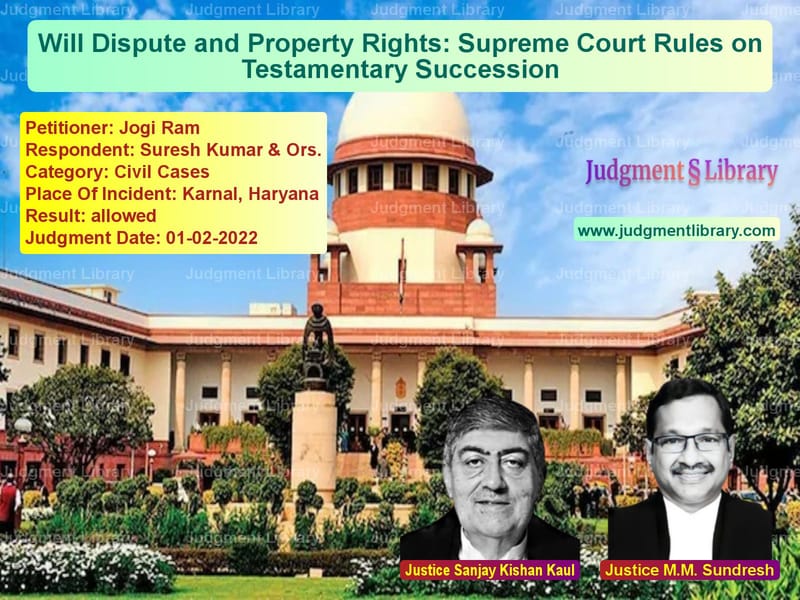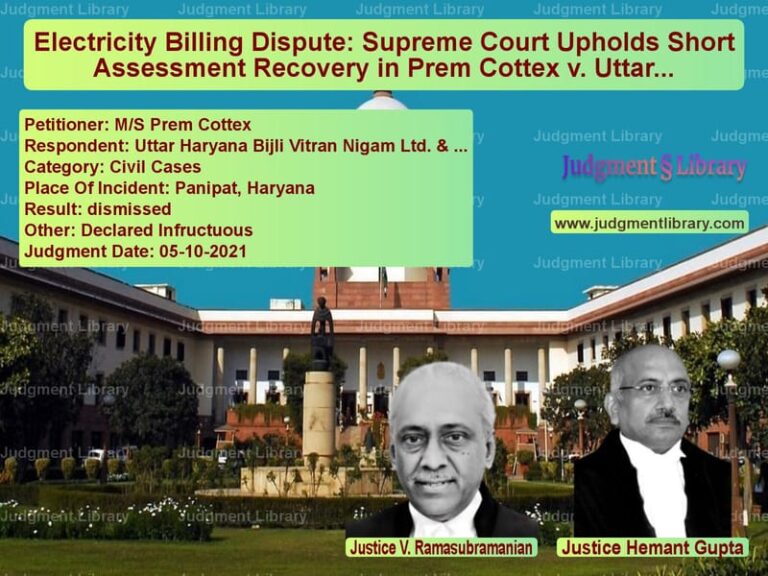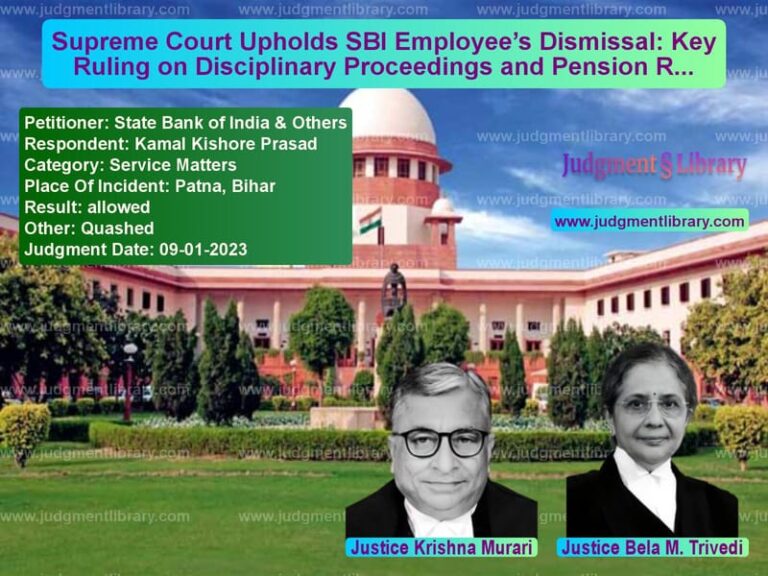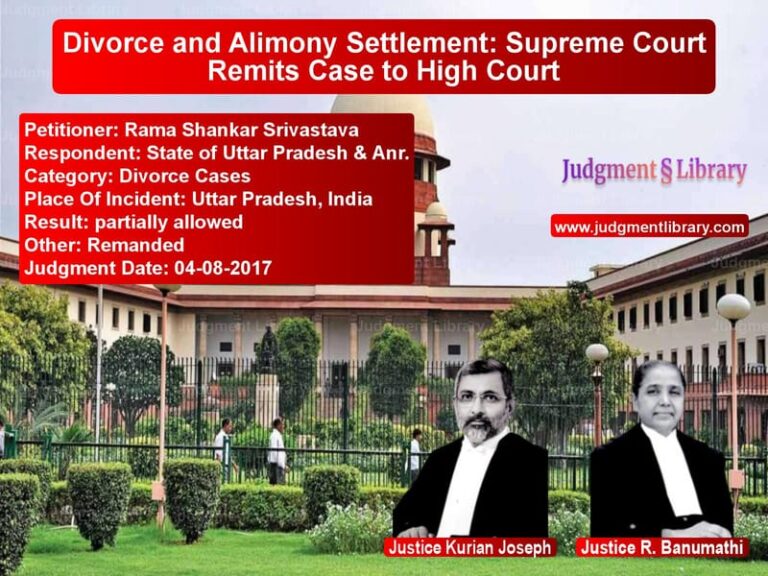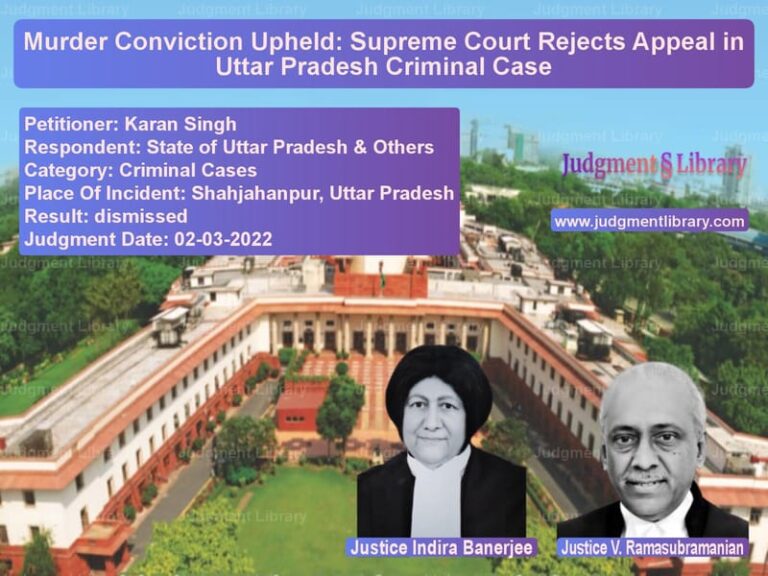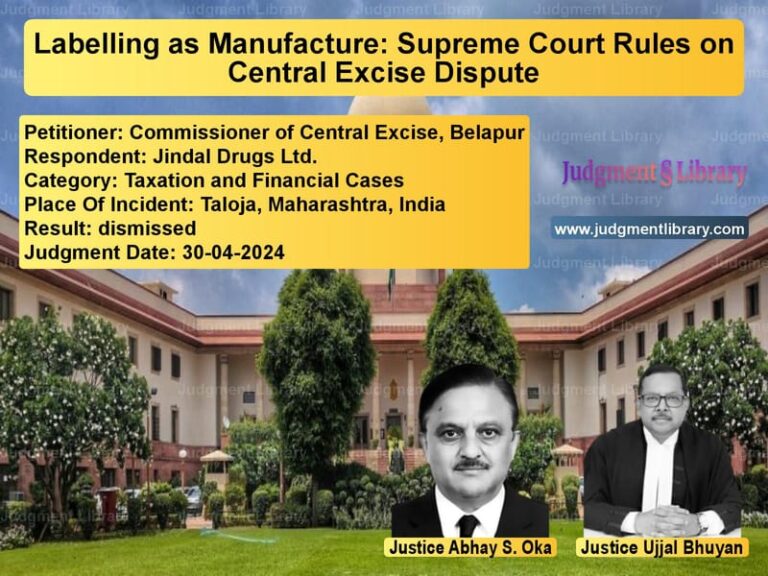Will Dispute and Property Rights: Supreme Court Rules on Testamentary Succession
The Supreme Court of India recently delivered an important judgment in the case of Jogi Ram vs. Suresh Kumar & Ors., dealing with a long-standing property dispute arising from a will executed in 1968. The case highlights key issues regarding the interpretation of testamentary succession, the applicability of Section 14 of the Hindu Succession Act, 1956, and the rights of third-party purchasers.
Background of the Case
The case originated from a will executed by Tulsi Ram on 15.04.1968, who passed away on 17.11.1969. The will divided his estate between his son, the appellant Jogi Ram, and his second wife, Ram Devi. Under the will:
- The appellant was granted absolute ownership of his half share of the land and property.
- Ram Devi was granted a limited ownership of her share for her lifetime, with a specific restriction that she could not alienate or transfer it.
- Upon her demise, her share was to vest absolutely in the appellant.
The dispute arose when Ram Devi’s daughter, Bimla Devi, filed a suit claiming ownership of half of the property bequeathed to her mother. This led to a series of legal battles spanning decades, including alleged collusive decrees and third-party sales.
Petitioner’s Arguments
- The appellant argued that Ram Devi was only given a limited estate, as explicitly mentioned in the will.
- It was contended that Section 14(2) of the Hindu Succession Act applied, which prevented her limited estate from converting into absolute ownership.
- The appellant further asserted that the sales executed by Ram Devi were illegal and that the subsequent buyers had no valid claim.
- The principle of res judicata was invoked, as previous judgments had already declared Ram Devi’s interest in the property as a limited estate.
Respondents’ Arguments
- The respondents, who had purchased land from Ram Devi, argued that her limited estate matured into absolute ownership under Section 14(1) of the Hindu Succession Act.
- They relied on the Supreme Court’s ruling in V. Tulasamma & Ors. vs. Sesha Reddy, which expanded the scope of property rights granted to Hindu women.
- The respondents claimed to be bona fide purchasers protected under Section 41 of the Transfer of Property Act.
- They also contended that the earlier judgments did not operate as res judicata since the legal position had evolved.
Supreme Court’s Judgment
The Supreme Court ruled in favor of the appellant, setting aside the High Court’s decision and reaffirming the Trial Court’s findings. The Court addressed three key aspects:
1. Applicability of Section 14(1) and 14(2) of the Hindu Succession Act
- The Court held that Section 14(2) applied because the will explicitly limited Ram Devi’s interest in the property.
- It clarified that a Hindu male has the right to create a restricted estate through a will, which does not automatically convert into absolute ownership under Section 14(1).
- Since Ram Devi’s right was derived solely from the will and was restricted in nature, she could not claim full ownership.
2. Validity of Sales Executed by Ram Devi
- As her rights were limited, Ram Devi’s sales were deemed invalid, and the purchasers could not claim better title than what she held.
- The Court emphasized that bona fide purchasers cannot override pre-existing restrictions on property ownership.
3. Effect of Previous Litigation and the Principle of Res Judicata
- The Court ruled that prior judgments declaring Ram Devi’s limited estate were binding and operated as res judicata.
- It rejected the argument that the legal position had changed, reaffirming that the issue had been conclusively settled.
Key Excerpts from the Supreme Court Judgment
The Supreme Court observed:
“If the wife is disinherited under a will, it would be sustainable, but if a limited estate is given, it would mature into an absolute interest irrespective of the intent of the testator. That cannot be the objective, in our view.”
The Court further held:
“The testator, Tulsi Ram, ensured maintenance for his wife by providing her the income from the estate but wished to give her only a limited life interest in the property. Section 14(2) of the Hindu Succession Act is applicable, and the subsequent sales made by Ram Devi are invalid.”
Final Verdict
The Supreme Court allowed the appeal, restoring the lower court’s decision and declaring the sales executed by Ram Devi null and void. It reaffirmed the appellant’s absolute ownership rights over the entire property.
Conclusion: Implications of the Judgment
This judgment has far-reaching implications for testamentary succession and property rights:
- It confirms that Section 14(1) of the Hindu Succession Act does not automatically apply to property acquired through a will with restrictions.
- It reaffirms the principle that a testator can impose valid limitations on property bequeathed through a will.
- It upholds the importance of prior judicial rulings in determining ownership disputes.
- It clarifies that third-party purchasers must exercise due diligence when acquiring property with known legal encumbrances.
The ruling sets an important precedent in inheritance law and strengthens the position of property owners in protecting their testamentary intentions.
Petitioner Name: Jogi Ram.Respondent Name: Suresh Kumar & Ors..Judgment By: Justice Sanjay Kishan Kaul, Justice M.M. Sundresh.Place Of Incident: Karnal, Haryana.Judgment Date: 01-02-2022.
Don’t miss out on the full details! Download the complete judgment in PDF format below and gain valuable insights instantly!
Download Judgment: jogi-ram-vs-suresh-kumar-&-ors.-supreme-court-of-india-judgment-dated-01-02-2022.pdf
Directly Download Judgment: Directly download this Judgment
See all petitions in Succession and Wills
See all petitions in Property Disputes
See all petitions in Landlord-Tenant Disputes
See all petitions in Contract Disputes
See all petitions in Specific Performance
See all petitions in Judgment by Sanjay Kishan Kaul
See all petitions in Judgment by M.M. Sundresh
See all petitions in allowed
See all petitions in supreme court of India judgments February 2022
See all petitions in 2022 judgments
See all posts in Civil Cases Category
See all allowed petitions in Civil Cases Category
See all Dismissed petitions in Civil Cases Category
See all partially allowed petitions in Civil Cases Category

